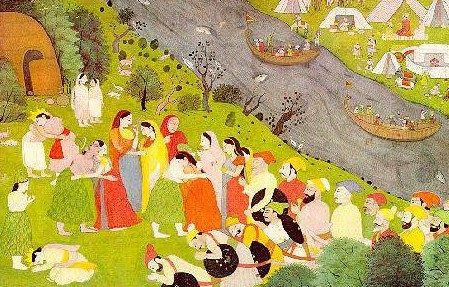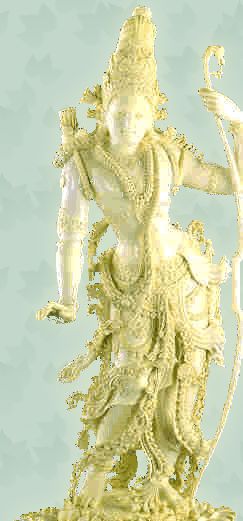Rama spoke to them soft and sweet and persuaded them to control their emotions; then, he walked towards the mothers, but could not bear to look on that picture of misfortune and misery. He became aware of the calamity that had befallen, but he soon consoled and comforted himself; he drew Lakshmana near him and told him the fact. Feeling that it would be better that Lakshmana be informed more fully, he requested Sumanthra, the loyal Minister of the Line, to relate to him the details and also the facts regarding administration of Ayodhya.
At this, Sumanthra fell down unable to bear the burden of grief. Struggling to rise he said amidst sobs, "Lakshmana! Where can we have Dasaratha hereafter? He was reduced to ashes by the flames of sorrow at being separated from Rama, Sita and you. Ayodhya has become a jungle. Wherever you look, you see only sorrow; whatever you hear, you hear only wailing. Not merely men, even birds and animals cast off their lives when you left. Those who survive are keeping alive in the hope of your return." Hearing this, Lakshmana shed streams of tears. He stood like a stump, unable to reply.

Without a word, Lakshmana approached Rama, and told him in a faltering voice, "I could not imagine, even in my dreams, that such a terrible calamity would happen. We could not see our father in his last moments." Rama consoled him, saying that there was no profit in grieving over what has already come to pass. "Physical bodies are as transient as bubbles in water; they are bound to burst and disappear, if not today, at least the day after," he said. He gave expression to many a moral maxim, until both the brothers went to the river, to finish the bath ritually laid down when one hears of the death of those who are near of kin.
Meanwhile, Sita went towards her mothers-in-law, and touched their feet in great reverence. She also prostrated before the feet of the wife of the Royal Preceptor. She met the women who had come from Ayodhya and with due consideration put them at ease, by her sweet welcome. When their eyes fell upon Sita, the Queens wept aloud. The womenfolk who had come from Ayodhya saw the plight of their charming young Princess and they were so overcome with sorrow that they too could not desist from wailing. Coming to know that Emperor Dasaratha had left the body, Sita prostrated before the Queens again and again, saying: "Alas! What great misfortune is ours! The Emperor gave up his life because he could not bear separation from us!" Sita felt that the news of Dasaratha's departure was as a thunderbolt on her heart. She and the Queens wept for long at the turn that events had taken. Every one that day could not take either food or drink; they had no mind for either. The entire day and night were spent in sorrow.
When the sun rose Vasishta directed Rama to perform the obsequies for the departed father. They were carried out in strict conformity with Sastraic injunctions. Since Sri Rama Himself uttered the mantra sanctifying the waters, "May the holy waters of Ganga, Yamuna, Godavari, Saraswathi, Narmada, Sindhu and Cauvery come into this vessel and sanctify the water therein", the ritual was rendered sacred and eminently fruitful.
Thereafter, the Preceptor, the Ministers of the Court, the Queens and the citizens of Ayodhya spent two full days with Rama, Lakshmana and Sita. At the end of the two days, Rama approached the Preceptor, and said, "Master! Those citizens and residents of Ayodhya are suffering very much here, drinking nought else but water and eating nought else but roots and tubers. Looking at Bharatha and Satrughna and also on the Mothers, I feel every moment is as long as an age. It is best you return to the City. You are spending your time here; the Emperor has ascended to heaven. It is not proper that I emphasize the urgency more. Please act, as seems most beneficial." With these words, Rama fell at the feet of Vasishta.
Vasishta replied, "Rama! Lord of the Raghu dynasty! Why do you speak thus? You have not realized how happy and contented these people are, since they are fortunate enough to be looking at your charm."
He called Rama to where he was and said, "Rama! Listen to the prayers of Bharatha. Conduct yourself in accordance with the wishes of good men, the interests of the people, the principles of politics and the directives of the Vedas". Rama recognized the affection that the Preceptor had towards Bharatha that found expression in these words; he knew that Bharatha would never deviate from the path of righteousness, that he would carry out his directions with full heart and in word, deed and thought and that he would always follow his steps and strive for his welfare and prosperity. He felt happy at this. So, he spoke softly and sweetly a few auspicious sentences, in response to the proposal made by the sage:
"Master! You are my witness, my father's feet are my witness. Let me assert this: No one is so dear to me as my brother, Lakshmana. No one has a brother in the world as dear as Bharatha is to me. Those who are attached to the feet of their preceptor are indeed really fortunate; you have such affection and compassion on him; that is his great treasure. He is younger than me, and so, I hesitate to praise him in his presence. My opinion now is that Bharatha should speak out his mind". Saying so, Rama prostrated before Vasishta and took his seat.

Vasishta turned towards Bharatha; for he could not reply direct to Rama. He knew that Bharatha was to be 'Ruler'. He said, "Give up all hesitations and doubts. Rama is your elder brother; he has immeasurable compassion. Open your heart to him; tell him all that you have in mind". Hearing these words of the sage, he felt that Vasishta had probed the mind of Rama and that both of them were inclined to favour him and grant his desire. So, he was glad at the turn of events.
Bharatha stood motionless before them. Tears flowed from his eye, red and bright like lotus petals. "The revered sage has told Rama all that has to be said. What remains for me to add specially to the appeal he has made on my behalf! I know full well the nature of my Rama. He has no anger against even wrong-doers. He has unbounded affection for me; I cannot deny it. A sense of shame has made me silent while I stand before him. But my affection makes me delighted to look upon him; my eyes do not feel content, however long they fix their gaze on him.
God could not tolerate my affection towards Rama; He could not bear to see so much love between brother and brother. So, He designed this distress, devising my mother herself as the instrument to bring it about. I know that it does me no credit or bring me any respect, if I say this. How can I establish my superiority by placing the blame in my own mother? When one proclaims himself innocent, can that statement make him truly so? I am myself hesitating to declare, because of my doubts that my mother is feebleminded or that I am good and intelligent. I am diffident to state so. Can pearls grow in the shells of snails that infest tanks? Why should I blame others for my sorrows? My misfortune is as vast as the Ocean. I know that all this tragedy has happened as a consequence of sins. I have been seeking a way of escaping from my grief, through some means, along any of the four quarters. I see now that there is one way out and only one.
My Preceptor is the great sage Vasishta; Sita and Rama are my sovereign Rulers. Hence I am certain all will be well with me. Lord! I do not wish for anything else: Rama! Grant but this one wish of your servant. Rama, Lakshmana, Bharatha and Satrughna are all four the physical progeny of Emperor Dasaratha. So all four are equally bound to obey the commands of their father. The father has equal affection for all the sons. And, there is no limitation or regulation that the commands of the father must be obeyed by this one son or that other son. You have borne the responsibility of obeying his commands, thus far. Now, it is our turn to bear the burden of exile; Sita, Rama and Lakshmana must return to Ayodhya and we two shall be in the forest as exiles until the sentence lapses. Confer on us this boon and bless us." Thus saying, Bharatha fell at the Feet of Rama.
Listening to this prayer of Bharatha, Vasishta shed tears of joy. Rama was not taken in by this argument. He said, "Bharatha! I feel that your line of thought is not as valid as you seem to think. It is not correct so to act. Ask me for anything except this." Bharatha replied, "In that case, brother, allow me and my brother to be with you here and serve you, as Lakshmana has been doing. This will then be a wholly satisfying holy life for us." Rama did not accept even this prayer.
He said, "Bharatha! For me as well as you, the commands of the father are unbreakable; we have to bow our heads in reverence before them, and carry them out without the least murmur. The most appropriate action for us all is that I should follow the orders issued to me and that you should follow the orders issued to you. let us not spend precious days in such purposeless talk and cause distress to the people who have come such long distances hoping against hope. Return to Ayodhya that has been allotted to you with them and rule them righteously. I shall carry out the task allotted to me and act righteously guarding and fostering the forest realm assigned to me." Neither Bharatha nor any one else could meet this decisive statement of Rama with any counter proposal or argument. They had to accept it as the right path to take.
Love